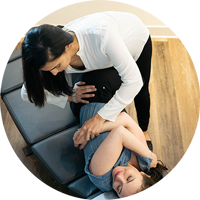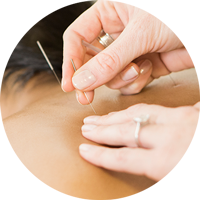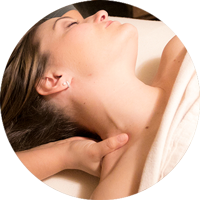Shoulder pain or injury affects most people at some point in life. Common shoulder issues often involve the rotator cuff muscles, impingement, dislocation or frozen shoulder. Being limited in your every day life due to shoulder issues can be constraining.
If you suffer from ailments related to frozen shoulder, we can help. We use an evaluation to assess a tune up of your strength, mobility and current treatments to improve symptoms through chiropractic care and restore your quality of life.
Schedule an Appointment
What is frozen shoulder?
Adhesive capsulitis, or frozen shoulder, is a condition where the shoulder joint is stiff, painful and causes restriction within normal range of motion. While the exact reason is unknown, many people are diagnosed with frozen shoulder after having been immobilized for a period of time due to surgery or illness. There have been links to inflammation and frozen shoulder. Some risk factors that might encourage this condition are diabetes, hormonal changes, shoulder surgery, thyroid conditions or issues with the cervical spine. It most commonly affects women over the age of 40.
There are three stages of frozen shoulder:
Stage 1 – Freezing or painful stage
This phase is when the pain is at its peak and range of motion is limited. It can last 3 to 9 months.
Stage 2 – Frozen or transitional stage
Use of the arm is extremely limited. Shoulder flexion, as well as both internal and external rotation that are restricted and painful. Can last 4-12 months.
Stage 3 – Thawing stage
When the range of motion improves and the patient starts to feel relief. This can last anywhere from 12 to 42 months.1
What are the symptoms of shoulder frozen?
Some of the symptoms of frozen shoulder include:
- Pain
- Stiffness
- Difficulty doing every day tasks
- Lack of mobility
- Difficulty reaching arms overhead
Diagnosis
Common tests for frozen shoulder are:
- Physical exam
- Range of motion screening
- Screening radiograph (ie, X-ray, MRI, etc.)
What are the treatments of frozen shoulder?
There are several ways to treat and manage frozen shoulder. This includes:
- Pain-relieving medication
- Applying hot or cold packs
- Intra-articular corticosteroid injections
- Chiropractic care for management and prevention
- Physical therapy to rebuild strength and increase flexibility
- Acupuncture
- Transcutaneous electrical nerve stimulation (TENS)
- Surgery
Chiropractic Treatment for Frozen Shoulder
Chiropractic care is a non-invasive, preferred option to help your body restore function and effectively heal from frozen shoulder. Rather than simply masking the pain or provide a temporary relief Chiropractic treatment can both relieve pain and unlock what caused disfunction in the first place, thus preventing reoccurrence.
After diagnosing the root cause of your pain and discomfort, we will work towards quickly eliminating the symptoms. Going beyond traditional chiropractic care, our rehab team gives you the tools you need for functional stability in order to stay active and injury-free for years to come.
Acupuncture Treatment for Frozen Shoulder
With an integrative team available at every clinic, our patients find that acupuncture is an additional form of therapy that helps in pain management and also helps to increase movement throughout treatment. Our acupuncturists may utilize Transcutaneous Electrical Nerve Stimulation (TENS) that helps to stimulate the release of the body’s natural pain relief systems.
If you are seeking support for Frozen Shoulder, our integrative team is ready to get to the root cause of your pain. Come see why we are the #1 rated Chiropractic team on Yelp in the Chicagoland area. Fill out the form below to schedule your appointment!






